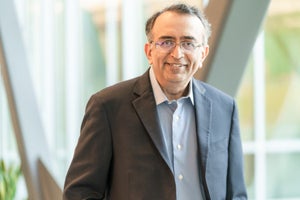VMware CEO looks to accelerate enterprise multicloud expansion

Since he helped build the highly successful ship that is VMware, it is widely expected the company’s CEO Raghu Raghuram, appointed in June, won’t rock that boat too much, at least in the near term.
 VMware
VMwareRaghuram is credited with helping build and grow the company’s core virtualization and multicloud business as well as its software-defined data center strategy. VMware also credits Raghuram with driving partnerships with Dell Technologies and hyper-scaler customers.
Since being appointed a little over 100 days ago, Raghuram has been focused on those efforts but also growing the company’s multicloud software subscription and SaaS business.
He inherited a good base to start with as VMware in its August Q2 2022 earnings call said total company revenue for the quarter was $3.1 billion, with combined subscription, SaaS, and license revenue growing 12% year-over-year to $1.5 billion.
In a press and analyst event last week Raghuram stressed the same theme that he laid out in his first financial analysts call in May: VMware’s mission is to provide foundational multicloud platforms for accelerating digital business.
“We provide a ubiquitous consistent software platform across clouds, data centers, and edge with which customers can rapidly build and modernize their applications. We empower them to operate their entire distributed environment with optimal cost, security and governance while leveraging their existing investments in our technology and skills to go faster to the future,” Raghuram said.
He has also spent a lot of time planning for VMware’s pending spin-off from Dell Technologies that Dell announced in April, which will create two free-standing companies.
Dell has had an 81% equity ownership of VMware Since 2016 when it paid $67 billion for EMC, which owned VMware. Under terms of the planned spin-off, VMware will distribute a cash dividend totalling $11.5 billion to $12 billion to VMware shareholders, which includes about $9.7 billion to Dell Technologies, the companies stated.
The two companies have had a close development relationship.That includes services such as VMware Cloud on Dell EMC, which combines VMware’s high-performance compute, storage, and networking software integrated with Dell EMC hyperconverged infrastructure (HCI). Specifically, it involves VMware vSphere, vSAN, and NSX and Dell EMC VxRail HCI delivered as a service managed by VMware.
Raghuram said that the split from Dell is on track for November and that VMware as a stand-alone company will have increased strategic, operational and financial flexibility to drive its growth strategy and will also be able to strengthen its strategic relationship with Dell.
“The Dell spin will let partners look at VMware in a new light and allow us more flexibility in growing our own business,” Raghuram said.
The Dell situation hasn’t been the only thing on the new CEO’s plate. Raghuram said he has also focused on further developing VMware’s multicloud strategy in a post-pandemic enterprise world.
“The pandemic has accelerated what was already happening in that there are now many more distributed applications, infrastructure and people, and because of the way things have been accelerated people are finding that this distributed multicloud world is pretty complex and we are looking to reduce that complexity,” Raghuram said.
Making the distributed world look like one logical entity that can be managed easily is a tough proposition, Raghuram said. “How we make all of that work easier for customers is our mission,” he said.
Another hot topic has been enabling business workforces that either work at home full or part-time. “How do we enable the anywhere workspace that will be staying with us for the foreseeable future?” Raghuram said.
At the heart of VMware’s remote work technology is its VMware’s Anywhere Workspace package that brings together the company’s core enterprise software products, including Workspace ONE unified endpoint management, Carbon Black Cloud cloud-native endpoint security, and secure access service edge (SASE) components, into a single system to support a widely distributed workforce.
“Customers are rethinking everything in terms of security and access for distributed resources,” Raghuram said.
Copyright © 2021 IDG Communications, Inc.

